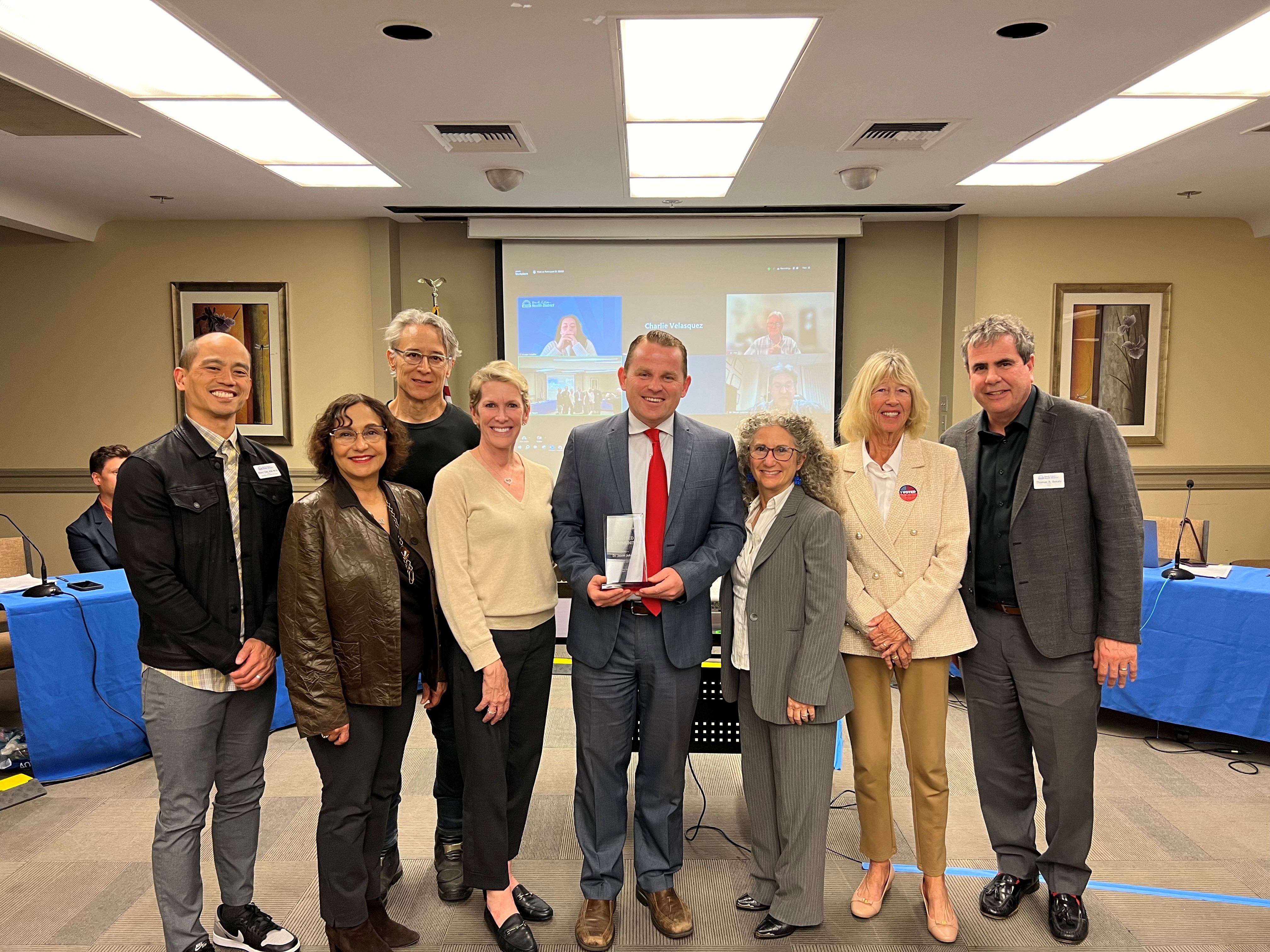Steve Aspel and Bill Brand are leading the race, aligned in many ways but differing on how the City moves forward. Michael Ian Sachs wants everyone to work together, while Chris Mowatt’s an idea man. And all the while, Eric Coleman is bringing the noise, hammer included.
The Redondo Beach Mayoral race ostensibly ends on March 7. But with such a diverse field, it’s unlikely that any candidate will win a majority of the votes in Redondo Beach, likely forcing a runoff election. And while each candidate loves Redondo Beach in his own way, each is expressing it differently.

Coleman, for instance, does so by constantly running for election.
Four years ago, Coleman ran in a mayoral race that would eventually give Aspel his first term as mayor following eight years on City Council. That time, Coleman ran as serious a campaign as he could muster, while also acknowledging that he was filming a documentary on the side.
Two years ago, he ran for City Council in District 3, which Christian Horvath would eventually win. That time, Coleman went off-the-wall, bringing props to debates and stating that “while [he] may appear a clown, the system is a joke and elections are a circus.”
This time, Coleman is drawing from the well of national politics, with bombastic rhetoric, calling for “the homeless eating the homeless” to solve homeless issues in Redondo Beach.
Coleman describes himself as a diehard libertarian and a rabid socialist, calling this campaign “anarchy in action.” The existing race, he said, is “NIMBYs versus fascists,” as the two political machines of Brand and Aspel work against each other. He, however, wants to be a wrench in the works.
“Council meetings are dull and uninspired…it’s like a board room, or a military tribunal, meant to intimidate and limit discussion and debate,” Coleman said. He recognizes the City Council’s power to restrict citizen freedoms, he said, and he’d like to see it go the other way.
But he acknowledges that he won’t win, and he’s fine with that — so long as he’s not in last. He’s planned a concert, Pier Aid, to “save the pier” at The Boogie on March 5.
“Why am I doing it this way? It’s fun,” Coleman said. “It’s just more fun.”
Michael Ian Sachs feels, in a way, that he’s already won.
The District 3 resident, and retired employee of the Chevron El Segundo refinery, has an enlightened outlook on the race, given that he’s been trying to add levity and civility to what’s been an ugly election season.
“I saw the adversarial politics, and I was very successful in my last job with conflict resolution. Not just with individuals, but groups,” Sachs said. “I thought I could be helpful in that way, and I believe I already have been.”
Sachs’s position is that the mayor should be a mediator — a sense of calm in the middle of a storm. It’s why he’s chosen to not publicly take a stance on Measure C, the harbor rezoning measure that is aimed at stopping the planned CenterCal harbor redevelopment project.
“I’m trying to give people an option other than these adversarial measures or politics; no matter who becomes mayor, these two groups are going to be there,” Sachs said. “I’m someone who works for both sides.”
After putting in more than two decades in the refining industry, Sachs is filling his days with music and politics, and he’s glad to talk about both at length.
But locally, he knows that he — and Redondo citizens — have a tough choice ahead of them.
“For me, if it’s the same as it is now in 10 years, that’s okay. If this new thing comes in, I’d adapt. But everyone has to make their own decision,” Sachs said. “But when you get people flipping each other off at meetings, or talking about other people’s children, that’s unacceptable to me…I want to help the process by saying that this is undermining our goals.”
Chris Mowatt, however, believes the role of mayor is a take-charge leader, and he feels he has the ideas to do the job, not to mention the wherewithal.
His website, christophermowattformayor.com, is stacked with ideas, from turning the vacant grocery store site on Artesia Boulevard into the home for an online university, to establishing park-and-ride lots on the outskirts of town for commuters.
“I think that ideas go hand-in-hand with management,” Mowatt said. “You can have a guy saying ‘Why don’t we have every Thursday be Free Ice Cream Day,’ but you need to have someone with follow-through to make it happen.”
He believes he has the skills to make that work happen, and that he’s able to work with people from all walks of life. He also believes that North Redondo has been largely ignored by the South, which is why he chose to run for mayor rather than District 4 City Council.
“There are a lot of people in the north who feel we’ve been neglected or ignored…we have a revolving door on business in North Redondo, skyrocketing rents, and there isn’t enough focus there,” he said.

Bill Brand is one of the two favorites for the race, his signs dotting yards throughout the city. He feels that he and Steve Aspel see many things the same way in Redondo Beach, from public safety to parks, with development as their biggest splitting point.
But he still hasn’t let his sense of activism slide by.
While walking in District 3, he encountered a resident who quickly said that she’d vote for him, but that she was on the fence about Measure C.
Brand spent the better part of the next twenty minutes answering her questions and selling her on the ballot measure, which he’s thrown his full support behind.
“It looks like Santa Monica,” he said, pointing to a render of the project.
“I like Santa Monica!” she contended, saying that she likes going to Manhattan Beach with friends and family.
“Well, that’s exactly why we have to revitalize the waterfront,” Brand said. He just wants it at a smaller scale than CenterCal is asking for.
“That was one of the most difficult stops,” Brand said, noting that he’s seen the gamut of voters who either shut the door in his face or pat him on the back.
But in voting for mayor, he believes the people of Redondo aren’t just voting in a figurehead.
“It’s a critical leadership role; people are electing personality, policy and process…Sachs is saying he sees himself as a consensus builder, but you’re also a leader — you’ve got to be both,” Brand said. “Someone who understands and someone who can work collaboratively with all levels of government.”

Steve Aspel seems to understand that. On his way to knock on doors on Saturday, he detoured to take photos of graffiti-covered houses near Avenue C. He stopped to speak to neighbors about the incident, then called the city manager to get the problem cleaned up immediately.
While walking in Brand-friendly District 2, Aspel encountered a man who was for the development project and leaning toward Brand for mayor.
Aspel nodded, and told the man that he was personally voting no on Measure C, and stopped there.
“The only guarantee I give people is that whichever way this thing goes, we will act on that,” Aspel told the resident.
Though it’s taken a toll, Aspel and his family have weathered the criticism that they’ve faced this election season.
“I don’t want to lose longterm friends and neighbors over Measure C,” said his wife Pam, sighing. “I’ve had friends I’ve known over 20 years who said they can’t support the Waterfront. I asked if they’ll vote for Steve, and they said ‘We’ll see.’” They’ve both heard stories about families who have split, children thrown out of homes, for differing opinions.
Steve Aspel, however, still sees the day-to-day as key to citizen’s lives.
At the row of homes that had been tagged with spray paint, Aspel spoke to one neighbor, who complained that the City had let cleanup lag for a week, even after filing a police report.
“That’s because you didn’t call me,” Aspel replied. ER








